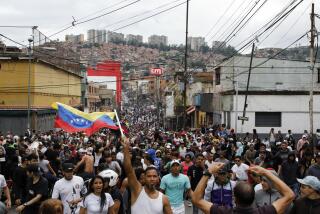Majluta, Balaguer Lead Dominican Vote
- Share via
SANTO DOMINGO, Dominican Republic — Dominicans voted in a presidential election Friday, taking part in a democratic process that began after U.S. intervention in the civil war of 1965.
Former Presidents Jacobo Majluta, 51, and Joaquin Balaguer, 78, were running a close race for the lead in initial returns late Friday. With ballots from only 238 of 6,024 polling places counted, Majluta had 38.3% and Balaguer 35.9%.
Juan Bosch, 76, another former president, had 24.3%. Three other candidates shared the rest of the vote.
The Friday results were too sketchy to constitute a trend. Electoral officials said it would take at least until today to tabulate enough returns to determine the winner of the hotly contested race.
Three people were killed in shooting incidents at two different polling places, but the balloting was otherwise peaceful.
Ruling Party Candidate
Senate President Majluta, who was president for a month and a half after President Antonio Guzman committed suicide in 1982, is the candidate of the ruling Dominican Revolutionary Party. The now-blind Balaguer, who was president from 1966 to 1978, heads the center-right Social Christian Reformist Party. And Bosch, who describes himself as a Marxist, heads the Dominican Liberation Party. He was deposed by a coup in 1963 after seven months as president.
Majluta said after he voted Friday that he was sure of victory. “I have full confidence that I am going to win the elections and full confidence that we are going to unite the country,” he said.
The three former presidents are trying to succeed the incumbent, Salvador Jorge Blanco, who did not run for a second term. Jorge Blanco’s popularity, high when he took office four years ago, was diminished by an austerity program that he implemented to stabilize the deteriorating Dominican economy. Three minor party candidates were also in the race.
Both Bosch and Balaguer expressed concern Friday about the ink used to stain voters’ fingers as a way to prevent repeat voting.
“There are some places where the ink is good, but in most places it is bad,” Balaguer said. “It wipes off easily.”
Washable Ink
Bosch said, “At most polling tables the ink is not indelible ink; it comes off with soap and water.”
As an added precaution against repeat voting, a small patch of hair was being shaved from the right arm of every voter.
All three candidates had voiced fears in the campaign that opposing parties would try to win by electoral fraud.
Galo Plaza, former president of Ecuador and an election observer for the Organization of American States, said he visited 53 polling places during the day and found that “everything was correct--no problems.”
But at a polling place in a poor neighborhood of Santo Domingo, a young man was shot to death in a confused incident involving members of rival parties. And in the town of Paraiso, 125 miles west of here, two men were killed and two were wounded when a soldier guarding a polling place accidentally fired his automatic rifle, Dominican newspaper correspondents reported.
Half a dozen people were killed in political violence during the heated election campaign.
This year’s contest was expected to be closer than the last election four years ago, when Jorge Blanco won with 47% of the vote. Balaguer finished second, with 37%, and Bosch was third, with 10%.
Since 1982, the Revolutionary Party has been accused of corruption, and Jorge Blanco’s austerity program has cost it popular support.
Balaguer’s Reformist Party has reorganized, joining forces with the small Social Christian Party and recruiting a new generation of young activists. Bosch’s leftist Liberation Party has intensified its organization of neighborhood committees around the country.
1963 Overthrow
Bosch, a founder of the Dominican Revolutionary Party, won the election of 1962 with 59% of the vote, but military officers, who considered his social reform programs to be radical, overthrew him in September, 1963. Civil war broke out when Bosch’s followers tried to put him back in power. President Lyndon B. Johnson sent in troops to control the fighting.
In 1973, Bosch left the Revolutionary Party and formed the Liberation party.
Majluta, who has a degree in finance from the University of Santo Domingo, became president of the Revolutionary Party in 1976. Elected vice president in 1978, he served as president for the last 43 days of the term after Guzman’s suicide.
More to Read
Sign up for Essential California
The most important California stories and recommendations in your inbox every morning.
You may occasionally receive promotional content from the Los Angeles Times.













